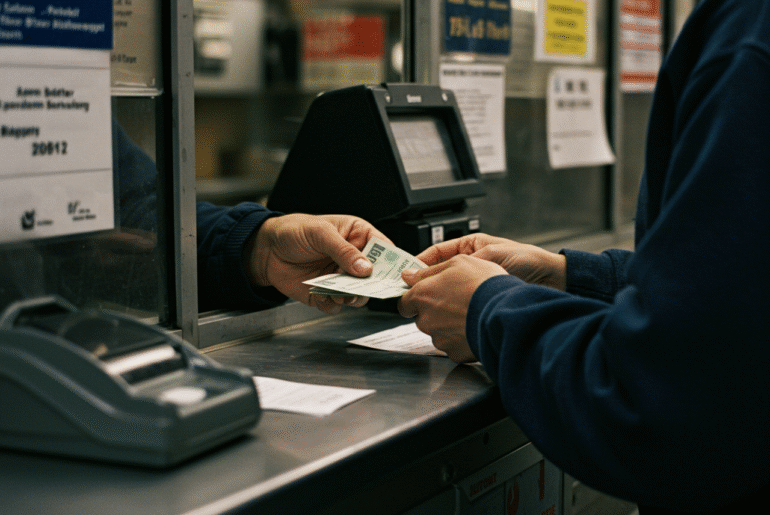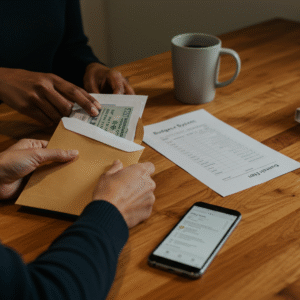This article may contain references to products or services from one or more of our advertisers or partners. We may receive compensation when you click on links to those products or services. Nonetheless, our opinions are our own.
The information presented in this article is accurate to the best of our knowledge at the time of publication. However, information is subject to change, and no guarantees are made about the continued accuracy or completeness of this content after its publication date.
- What Is Check Cashing and How Does It Work?
- How Check Cashing Works
- Pros and Cons of Check Cashing Services
- How to Choose a Check Cashing Location
- Safe Check Cashing Tips
- Cost-Saving Alternatives to Check Cashing
- Managing Your Finances After Cashing a Check
- Final Thoughts
- Frequently Asked Questions
- Recommended Reads
What Is Check Cashing and How Does It Work?
Have you ever found yourself in a pinch, needing cash but unsure where to turn? If so, you might have encountered check-cashing services. While conventional banking options can sometimes feel daunting or inaccessible, check cashing offers a straightforward option, providing immediate access to funds without the need for a bank account. This will explain what check cashing is, how it works, and the benefits and potential downsides you should consider. Whether you’re facing an unexpected expense or simply want to know more about your financial options, understanding check cashing can empower you to make informed decisions about your money.
How Check Cashing Works
When you receive a check, there are several options available for cashing it, but understanding how check cashing works can simplify the process. Typically, you can cash a check at banks or credit unions where you hold an account, check-cashing stores, or even some retail locations. Each of these options has its own set of advantages and potential fees. For instance, cashing a check at your bank may be free or come with a minimal fee, whereas check-cashing stores often charge a percentage of the check amount. Here’s what you should keep in mind:
- Identification: Most places will require valid ID, such as a driver’s license or state ID.
- Fees: Be aware of the fees involved. Retailers may charge a flat rate or a percentage.
- Check Types: Ensure the check is cashable; personal checks and government checks are usually accepted, while others may not be.
Furthermore, the process typically involves presenting your check and ID to the teller, who will then validate the check, ensuring it’s genuine and has sufficient funds backing it. If you’re cashing a larger check, it might take extra time to verify, so be patient.
Pros and Cons of Check Cashing Services
Using check cashing services can offer several advantages, especially if you find yourself needing immediate access to cash without going through the traditional banking system. These services typically provide fast cash access, allowing you to cash your checks quickly, frequently within minutes. This can be particularly beneficial if you’re facing unexpected expenses and need to cover immediate costs such as bills, groceries, or emergency repairs. Furthermore, check cashing services often have more flexible requirements than banks, which makes them accessible to individuals without a bank account or those with poor credit histories. However, while the convenience is appealing, it’s vital to be aware of the potential downsides. The costs associated with check cashing can add up quickly, as many services charge hefty fees, which can be a percentage of the check amount. Additionally, there’s the risk of relying on these services too heavily, creating a dependency that may hinder your overall financial health. It’s necessary to evaluate whether the benefits outweigh these costs and consider setting up a budget to minimize your need for such services in the future.
Advantages:
- Rapid access to cash
- No bank account required
- Less stringent requirements
Risks:
- High fees can accumulate
- Potential for financial dependency
- Limited security and consumer protections
How to Choose a Check Cashing Location
Finding the right check cashing location can make a critically important difference in your overall experience and satisfaction. Here are some factors to consider that can help you make an informed decision:
- Fees: Different locations charge varying fees for check cashing services. Always compare these costs to avoid unexpected expenses.
- Services Offered: Not all check cashing businesses offer the same services. Some may provide additional options like bill payment or prepaid card services, which can be convenient for managing your finances.
- Location and Accessibility: Choose a cashing location that’s easy to access, whether it’s close to home or your workplace. Think about your schedule and how frequently you’ll need to cash checks.
- Customer Service: A friendly and knowledgeable staff can make a significant impact on your experience. Look for places that are known for their excellent customer service.
- Reputation: Research reviews and ask for recommendations from friends or family. You want to choose a trustworthy establishment with a solid reputation.
| Location | Fees | Additional Services | Customer Reviews |
|---|---|---|---|
| Local Bank | Low | Account Services | Positive |
| Check Cashing Outlet | Moderate | Prepaid Cards | Mixed |
| Convenience Store | High | None | Neutral |
Voted "Best Overall Budgeting App" by Forbes and WSJ
Monarch Money helps you budget, track spending, set goals, and plan your financial future—all in one app.
Get 50% OFF your first year with code MONARCHVIP
Safe Check Cashing Tips
Cashing checks can be a straightforward process, but it’s necessary to take precautions to protect yourself against potential scams. Here are a few tips to ensure you handle your check cashing safely:
- Verify the Check’s Authenticity: Always inspect the check for inconsistencies. Check for proper signatures, watermarks, and any unusual markings that might indicate fraud.
- Know Your Cashing Location: Use reputable banks or credit unions to cash your checks. Avoid cashing with unfamiliar or unverified check cashing services.
- Keep Personal Information Private: Never share your Social Security number or bank account information unless absolutely necessary. Protect your personal data as if it were cash in your pocket.
- Limit the Amount of Cash: If possible, cash only what you need and deposit the rest. This limits your exposure in case of an unforeseen issue.
Cost-Saving Alternatives to Check Cashing
If you’re tired of paying high fees at check-cashing services, you might be surprised to learn there are several alternatives that can help you keep more of your hard-earned money. Using a bank or credit union is one of the best options. Most institutions allow you to deposit checks directly into your account, where you can access the funds via a debit card or ATM without incurring additional fees. If you’re not a fan of traditional banking, mobile check deposit through your smartphone is a convenient option. Just snap a picture of your check within your banking app, and the funds can be available in your account within a few days. For those who prefer instant access to cash, consider using prepaid debit cards. Some services allow you to load checks onto the card, often with lower fees than check-cashing locations. Additionally, many local retailers and supermarkets offer check-cashing as a service, frequently at reduced rates compared to dedicated check-cashing stores.
| Service | Estimated Fees |
|---|---|
| Bank Check Deposit | Free |
| Mobile Check Deposit | Free |
| Prepaid Debit Card | $3–$5 |
| Retail Check-Cashing | Varies ($1–$3) |
Managing Your Finances After Cashing a Check
Cashing a check can provide an immediate influx of cash, but the next steps you take are vital for your financial health. Once the cash is in your hands, consider these important actions to maximize its potential:
- Create a Budget: Allocate your newfound funds towards necessary expenses, savings, and discretionary spending.
- Pay Off Debt: If you have outstanding debts, using some of your cash to pay them down can save you money on interest.
- Build an Emergency Fund: If you don’t have one yet, consider saving a portion for unexpected expenses.
- Invest in Your Future: Think about putting some cash into retirement accounts or investment funds.
| Purpose | Amount ($) |
|---|---|
| Necessities | 200 |
| Debt Repayment | 150 |
| Emergency Fund | 100 |
| Investments | 50 |
Final Thoughts
Check cashing provides a fast and accessible way to turn checks into cash, especially for those without traditional bank accounts. While the convenience is appealing, it’s important to understand the costs and risks involved. By exploring lower-cost alternatives, using safe practices, and managing your funds wisely, you can make smarter financial decisions. Ultimately, knowing how check cashing works empowers you to take better control of your financial life.
Frequently Asked Questions
What is check cashing?
Check cashing is a financial service that allows individuals to cash checks without needing a bank account. This service is typically offered by check cashing stores, convenience stores, or payday loan establishments. Customers can present their checks and receive immediate cash, frequently for a fee or a percentage of the check amount.
How does the check cashing process work?
To cash a check, you would typically bring the check to a check-cashing location along with a valid form of identification. The cashier may verify the check’s authenticity and check whether there are sufficient funds to cover it. After verification, you would receive cash on the spot, minus any fees.
What types of checks can be cashed?
Most check cashing services will cash various types of checks, including payroll checks, government checks, and even personal or business checks, although policies may vary depending on the provider. It’s important to confirm what types of checks are accepted at a particular location.
What fees are associated with check cashing?
Fees for check cashing can vary widely, usually ranging from a flat fee to a percentage of the check amount. It’s important to be aware of these fees before deciding to cash your check, as they can affect the total amount of cash you receive.
Who uses check cashing services?
Check cashing services are often utilized by individuals who do not have a bank account, those who need immediate access to funds, or people who may have difficulty obtaining banking services for various reasons. This service provides a convenient option for quick cash.

Reviewed and edited by Albert Fang.
See a typo or want to suggest an edit/revision to the content? Use the contact us form to provide feedback.
At FangWallet, we value editorial integrity and open collaboration in curating quality content for readers to enjoy. Much appreciated for the assist.
Did you like our article and find it insightful? We encourage sharing the article link with family and friends to benefit as well - better yet, sharing on social media. Thank you for the support! 🍉
Article Title: Check Cashing: How It Works and What to Know
https://fangwallet.com/2025/07/31/check-cashing-how-it-works-and-what-to-know/The FangWallet Promise
FangWallet is an editorially independent resource - founded on breaking down challenging financial concepts for anyone to understand since 2014. While we adhere to editorial integrity, note that this post may contain references to products from our partners.
The FangWallet promise is always to have your best interest in mind and be transparent and honest about the financial picture.
Become an Insider

Subscribe to get a free daily budget planner printable to help get your money on track!
Make passive money the right way. No spam.
Editorial Disclaimer: The editorial content on this page is not provided by any of the companies mentioned. The opinions expressed here are the author's alone.
The content of this website is for informational purposes only and does not represent investment advice, or an offer or solicitation to buy or sell any security, investment, or product. Investors are encouraged to do their own due diligence, and, if necessary, consult professional advising before making any investment decisions. Investing involves a high degree of risk, and financial losses may occur including the potential loss of principal.
Source Citation References:
+ Inspo
There are no additional citations or references to note for this article at this time.












































